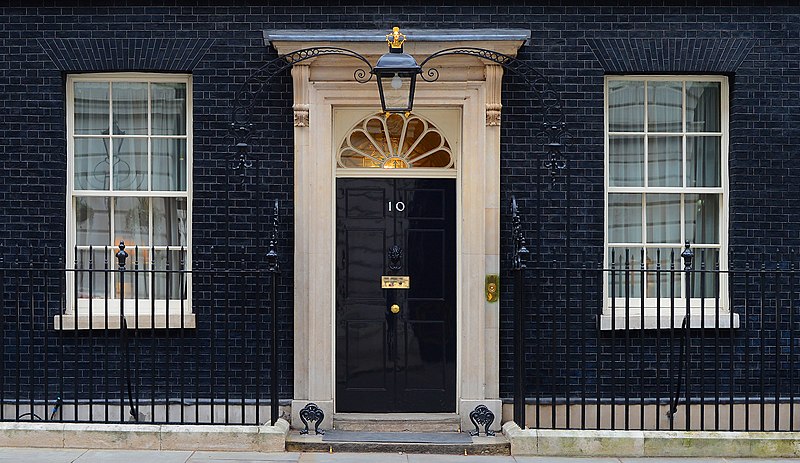Sign up for the daily CJR newsletter.
This article was featured in the Tow Center for Digital Journalism’s weekly newsletter. Subscribe here to stay up to date on our latest events and publications.
UK prime minister Boris Johnson, rocked by months of overlapping scandals, announced his resignation this month, less than three years after leading his Conservative Party to a landslide election victory.
Johnson’s resignation fired the starting gun on a Conservative leadership contest—he will remain caretaker until September 5—that’s playing out this summer. The winner automatically becomes UK prime minister.
Under Britain’s parliamentary system, any sitting Conservative MP can run for party leader, with the contest split into two phases. First, Conservative MPs whittle down a short list to two people. Second, the roughly 200,000 Conservative Party members vote for their preferred candidate.
Prime-ministerial hopefuls, then, must appeal to multiple key groups at once: fellow MPs, whose support they need to make the final ballot; right-leaning Conservative members, who ultimately decide the victor; the UK public, with a general election scheduled within two years; and the British press, with many outlets picking a horse in the race and aggressively attacking other candidates.
On July 20, from an initial short list of eleven leadership contenders, former chancellor Rishi Sunak and foreign secretary Liz Truss became the last two standing—and now face a runoff vote with Conservative members.
We spoke to Jim Waterson, The Guardian’s media editor, on what role the media is playing in the contest.
JB: How would you characterize the UK media landscape—and its involvement with Westminster politics—for US readers?
JW: The first major characteristic is, whereas in the US it’s the TV channels that are opinionated and the newspapers who are fairly neutral and anodyne, in the UK it’s always been the opposite. We have a heavily regulated broadcast sphere. The BBC, ITV, Sky, Channel 4, and the radio stations must follow due impartiality standards on news. But we have a famously wild print newspaper industry, which—despite the onrush of the internet—has largely maintained its power over politics.
A key thing that people in the US are often surprised by is the UK’s very centralized political and media sphere. It’s all in London. It’s all very close to each other, and there’s a very porous wall between the two. People flip back and forth. If you’re big in the media world in London, you’re almost certainly known in politics—in a way that isn’t necessarily the case of the US, where you’ve got different power bases in LA, DC, New York.
JB: And Boris Johnson is a perfect example of that merging of the political and media classes. How much is his rise and fall attributed to his dealings with the press?
JW: I mean, never let a journalist actually run something. It’s a very dangerous thing to happen. We’ve experimented with it for three years. The worst characteristics of every journalist, Johnson has taken into Downing Street: playing things late, hoping that the deadline can still be met, winging it with the words filed at the last minute.
Johnson is a media creation. He was the guy who pioneered the “grain of truth” story about European Union waste as the Daily Telegraph’s Brussels correspondent. That laid the ground for Brexit, which he then helped lead as a politician. He’s the guy who basically won elections based on the vibes of being a funny, jokey guy, and that reputation was built upon appearances on TV like the satirical BBC show Have I Got News for You. He was a Telegraph columnist all the way through his political career—right up until he became prime minister, he was still being paid a salary of £275,000 [$325,000] a year while being a serving politician. That’s something that I struggle to imagine happening in the States.
JB: Coming to the ongoing contest for prime minister—which is decided by 200,000 Conservative members—what influence does the press have on who wins?
JW: The classic thing with UK newspapers is they like to back winners. So they’re deciding: Do they wait to jump until they see a winner—to claim victory and call in favors later—or lead the public, give an endorsement and make a difference to the contest? Newspaper editorials influencing the race can become almost self-fulfilling prophecies. When a newspaper backs someone, it gives momentum to their campaign and makes it easier for other people to come on board, rather than necessarily persuading voters. It’s more of a signal someone’s doing well.
JB: So it’s best to understand the press as half-kingmakers, half-jostling to back the right horse for their own influence?
JW: Totally. Look at Rupert Murdoch, who owns the Sun and the Times. He’s a canny operator who’s happy to flip sides when it suits him. He supported New Labour under Tony Blair, and then when he realized that things were changing, he switched sides.
JB: Sticking with legacy media for now, who wields the most influence today?
JW: The Sunday newspapers [the Sunday Times, Mail on Sunday, Observer, etc.] are still the place you drop your scandalous story or your particularly explosive, grubby bit of briefing. The insurgent candidate Penny Mordaunt, who was topping polls with Conservative members, got an absolute kicking from the Sunday papers as rival teams tried to damage her. [Mordaunt was eliminated in the final round of MPs’ voting, on July 20.]
Mail on Sunday: Does leak show Penny did back
gender self-ID? #TomorrowsPapersToday pic.twitter.com/hRrKb75kQD— George Mann 🫧⚒️🫧 (@sgfmann) July 16, 2022
The main thing American audiences might not understand is the odd relationship in British media between the press and the publicly funded BBC. Newspaper sales have collapsed, but they really still set the mainstream news agenda, in part because the BBC follows up so many of their stories. That connection is really powerful. Highly political newspapers tend to break the news, and the BBC feels obliged to follow up something the Daily Mail says is a story, for fear of looking partisan if it didn’t. So there’s a lot of power in being a newspaper proprietor.
In [Johnson’s] Downing Street, talking to people in there, they were obsessed with what was in the Telegraph or Mail. It was real panic if the Mail was going for them or if the Telegraph was really critical of a policy. It’s kind of bizarre, the whole country in hock to these outlets and their editors.
JB: What about the leadership candidates’ tactics—are they so far directing messaging toward the media, toward conservative members, or toward the public?
JW: At the moment, it’s all among the MPs. To explain how Westminster reporting works, briefly, most political journalism in the UK is done through the “lobby system.” I used to be a lobby reporter myself. It’s quite odd. It means that rather than the US way—where you have lots of specialists who cover different arms of government—you have a general pool of all-politics reporters, and quite a lot of stories that come out through the lobby are briefed out to friendly publications. They’re intended to create political moments or cause damage to opponents, rather than necessarily to inform the public.
So we’ve seen a lot of briefings to conservative newspapers. It’s taking a party full of MPs who’ve known each other for decades—that know where the skeletons are buried—splitting them up into different leadership campaigns and saying, “You’ve got a week-long fight to the death to make the final ballot.” They’re just taking turns to brief stuff out and hope it destroys the other.
JB: Can you give some examples?
JW: Just look at Nadhim Zahawi, who was health secretary, made chancellor for two days, then immediately called on the prime minister to resign and launched a leadership bid. He watched as his campaign collapsed under the weight of questions about his own tax affairs. You’ve particularly seen the Daily Mail—which is known for taking no prisoners—being incredibly loyal to the outgoing Boris Johnson regime. The Mail’s being rigorously anti–Rishi Sunak, who they view as knifing Johnson, and seemingly is gearing up to back Liz Truss, the former foreign secretary.
MAIL: @RishiSunak caught in Cummings ‘toxic smears’ storm #TomorrowsPapersToday pic.twitter.com/nkj8lKaTMH
— Neil Henderson (@hendopolis) July 10, 2022
The ebbs and flows of a British political campaign can be incredibly brutal: you can come from nowhere, and then—to use a very distinctive British term—be absolutely shit-bagged very quickly. A well-timed and well-placed Machiavellian briefing for a Sunday newspaper can destroy a rival candidate’s career.
JB: Meanwhile, the Reuters Institute found 41 percent of people in the UK now mainly get the news from social media. How has this changed things—must prime-ministerial hopefuls now pitch to influencers and partisan pundits?
JW: In a general election they do. But in a very narrow election run within a party, they don’t necessarily. Conservative members are likely to be older, still read a print newspaper, and be more traditional than most of the UK. We’ve handed the keys to the whole country over to 200,000 Conservatives, a tiny, niche set of people.
But you cannot exaggerate the extent to which MPs in the UK are glued to Twitter. If you look down from the public gallery in the House of Commons during a debate, you can just see the iPhones lined up, with them all just refreshing Twitter. So little scandals can blow up. I do worry that very niche topics get pushed to the top of the leadership contest. So you end up with a fixation on things like trans rights rather than about the impending economic collapse. Whereas if you actually look at polling, normal voters are saying, “Hang on, how am I going to pay my energy bill this winter?” That’s a particular danger for Conservatives in this race, appealing to their narrow base rather than the public.
Obviously, though, the contest is being fought in public. It will influence how candidates are seen at the next general election. Interestingly, on TikTok—which is still emerging as a feature in UK politics and most people in Westminster still don’t engage with—one of the biggest viral clips is of Rishi Sunak, the leading candidate, age twenty, talking about being privileged and laughing about not having any working-class friends. It’s everywhere. It’s showing up in focus groups after bubbling to the top of people’s feeds.
JB: So UK politics doesn’t have figures like Tucker Carlson or Joe Rogan in the same way yet?
JW: I think it will go that way in a general election. I wouldn’t be surprised if you see the big-name podcasters being courted. TikTok is obviously primed to be enormous, because it drives so much culture in the UK. Politics is always about eighteen months behind when it comes to realizing trends, catching up, and trying to exploit them. But even then, they’re usually terrible at it. In 2015, when Jeremy Corbyn surged to the Labour leadership, that just completely baffled people in Westminster. The buzz was generated mainly on Facebook back then. And you saw in the 2016 Brexit referendum how actually understanding online audiences helped the Vote Leave campaign win. Westminster is often quite slow to catch up.
JB: Finally, what are your reflections reporting on the British press—how open are people, how easy is it to get stories, and so on?
JW: Journalists love to gossip, right? It’s relatively easy. There are very few places that report on other outlets, and there are very few left-leaning outlets in the UK. So I’m very lucky; I adore doing it. You’d be amazed by how many people at right-leaning outlets like to tell you that, secretly, they don’t agree with the politics at all, and they’re just carrying out orders. They tell me, “If you want the real inside story, then give me a ring anytime.” It’s never quite what it seems from the outside.
Has America ever needed a media defender more than now? Help us by joining CJR today.









